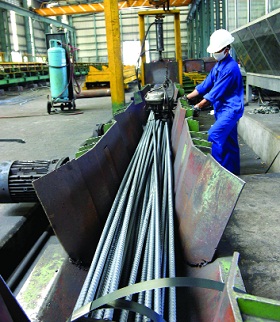Steel sector plea for fresh help
The Vietnam Steel Association recently requested the government take strict control over the approval of steel projects to avoid a glut of products.
 Many local steel firms are looking for a helping hand |
He said the production of other kinds of steel, particularly building steel, was so abundant that no more projects should be allowed to ensure stable production and sales for currently operating plants.
“Although the government has made several instructions to localities for granting steel project licences since early last year, including ceasing licencing for normal construction steel manufacturing, there have been no changes in the licencing activities in localities since late 2009.
“Local authorities in many regions have continued to grant licences for the production of steel which is in oversupply in the domestic market. That have created unhealthy competition among local steel-makers and many plants have to operate far lower than their capacity, resulting in ineffectiveness and waste,” Cuong said.
VSA statistics showed that as of March 2010, local steel plants had an overall capacity to produce 1.8 million tonnes of cast iron, 5.73 million tonnes of billets, 7.83 million tonnes of building steel, 1.3 million tonnes of pipes, 1.2 million tonnes of metal coated steel sheets and 2.5 million tonnes of cold rolled steel.
Last year, steel demand in Vietnam reached 11.7 million tonnes, including a half produced by Vietnam with the remainder imports, which were mostly materials Vietnam was unable to produce such as steel plates, hot rolled coils, alloy steel and manufactured steel.
“The plants’ capacity, which excluded some steel complex projects carried out recently by Taiwanese, Malaysian, Indian and Japanese investors, had exceeded local demand several times,” Cuong said.
He also requested in his letter the government look at some major foreign-invested steel projects, regarding to their ability to source capital and raw materials to carry out the projects. “It [the government] needs to revoke project licences which have no convincing reasons for lengthened time,” Cuong said.
In late April, Hung Nghiep Formosa Ha Tinh Steel Ltd, complained about its financial difficulties, demanding some tax and bank loan incentives from the Vietnamese government to implement the $8.7 billion steel project in Ha Tinh province.
According to the Taiwanese firm, it would have to borrow $6.2 billion from local and overseas banks, accounting for 71 per cent of the project’s investment, to carry out the project in three years.
A $5 billion steel project developed by India’s Tata Steel has also been unable to get an investment licence, almost two years after its submission for a licence for the first time in August 2008, because of many reasons, including the deadlock in site clearance and raw material supplies.
The government recently required Tata Steel to work closely with related agencies, including the Thach Khe Iron JSC company to clearly define its capability to supply iron ore for Tata Steel’s project.
Tata Steel was also requested to report about water supply for the plant and finalise environmental impact assessment report.
What the stars mean:
★ Poor ★ ★ Promising ★★★ Good ★★★★ Very good ★★★★★ Exceptional
 Tag:
Tag:
Related Contents
Latest News
More News
- Hermes joins Long Thanh cargo terminal development (February 04, 2026 | 15:59)
- SCG enhances production and distribution in Vietnam (February 04, 2026 | 08:00)
- UNIVACCO strengthens Asia expansion with Vietnam facility (February 03, 2026 | 08:00)
- Cai Mep Ha Port project wins approval with $1.95bn investment (February 02, 2026 | 16:17)
- Repositioning Vietnam in Asia’s manufacturing race (February 02, 2026 | 16:00)
- Manufacturing growth remains solid in early 2026 (February 02, 2026 | 15:28)
- Navigating venture capital trends across the continent (February 02, 2026 | 14:00)
- Motivations to achieve high growth (February 02, 2026 | 11:00)
- Capacity and regulations among British areas of expertise in IFCs (February 02, 2026 | 09:09)
- Transition underway in German investment across Vietnam (February 02, 2026 | 08:00)






















 Mobile Version
Mobile Version